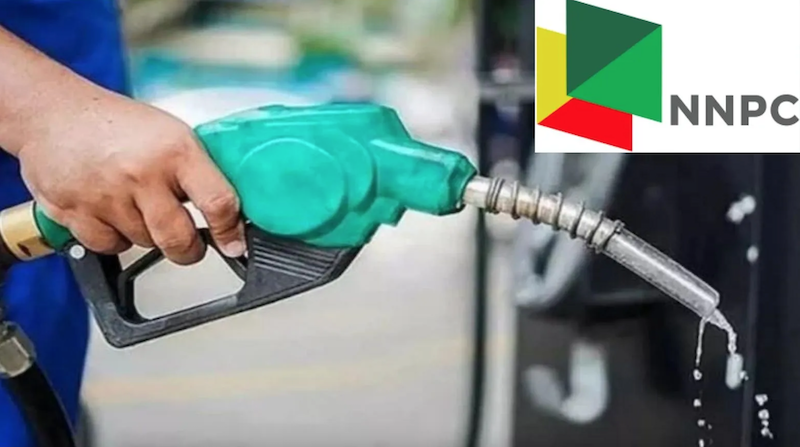EXCITING NEWS: TNG WhatsApp Channel is LIVE…
Subscribe for FREE to get LIVE NEWS UPDATE. Click here to subscribe!
The federal government has instructed the Nigerian National Petroleum Company (NNPC) Limited not to sell Premium Motor Spirit (PMS), also known as petrol, above “a certain regulated price”.
TheNewsGuru.com (TNG) reports this is contained in the audited financial statements of NNPC Limited released on Monday for the year ended 31 December 2023.
Since the Nigerian government-owned oil company made the release, the audited financial statements of NNPC Limited for the year ended 31 December 2023 has become a subject of public discourse.
NNPC in the financial statements noted that the cost of importing PMS is usually much higher than the regulated price and that the cost incurred as the energy supplier of last resort for energy security reasons, and all associated costs, shall be on the federation’s account.
Stressing that this is in line with Section 64(M) of the Petroleum Industry Act (PIA) 2021, NNPC Limited explained in the financial statements that the difference between the actual landing cost of the product and the regulated price is known as under recovery.
“In line with Section 64(M) of the Petroleum Industry Act (PIA) 2021, the cost incurred by NNPC Limited (Group) as the energy supplier of last resort for energy security reasons, and all associated cost, shall be on the account of the Federation.
“The government instructed that NNPCL cannot sell its Premium Motor Spirit (PMS) above a certain regulated price. However, the cost of importing this PMS is usually much higher than this regulated price.
“The under recovery is essentially the difference between the actual landing cost of the product and the regulated price. This balance is used to reduce the cost of sales of the Group. The corresponding entry is either used to reduce the liability due to the Federation or used as a receivable from the Federation.
“Premium Motor Spirit (PMS) cost under recovery is recognised where there is reasonable assurance that it will be received and all attached conditions have been complied with. When it relates to an expense item, they are deducted in reporting the related expense in cost of sales,” the company stated.
This translates to mean NNPC Limited buys petrol at a certain amount, sells it to marketers half of that amount, and on the instruction of the federal government, tells the marketers (market regulation) not to sell beyond a certain price. Meanwhile, the NNPC had said the market is fully deregulated.
Checks carried out by TNG on the audited financial statements released by NNPC Limited reveal PMS under recovery and energy security expenses grossing N3 trillion for the year ended 31 December 2023.
According to NNPC Limited, energy security expenses are expenses incurred by the group in fulfilling its obligations as the supplier of last resort for energy security purposes on the account of the federation in line with the provisions of Section 64(m) of the Petroleum Industry Act, 2021.
“These amounts are receivable to the Group as they are defrayed and charged against amounts due to Federation on a monthly basis,” the company stated.
Meanwhile, a forecast by NNPC Limited had shown that the cumulative PMS under recovery from August 2023 will hit N6.884 trillion by December 2024.
Further checks reveal that as of the end of December 2023, the Nigerian government was yet to defray the sum of N4.8 trillion to NNPC Limited. The government has only defrayed the sum of N649.4 billion.
“The total undefrayed cost is made up of January to May under recovery of N3.3 trillion and August to December energy security expense of N1.8 trillion,” NNPC Limited noted in the financial statements.
However, the Chief Financial Officer of NNPC Limited, Alhaji Umar Ajiya had explained that no marketer has received any money from the company by way of subsidy, stressing that “no one has been paid kobo by the NNPC Limited in the name of subsidy”.
Ajiya said: “No marketer has received any money from us by way of subsidy. What has been happening is that we have been importing PMS, which has been landing at a certain cost price and government tells us to sell it at half price.
“So the difference between the landing price and that half price is what we call shortfall. And the deal is between the Federation and NNPC Limited. To reconcile, sometimes they give us money. So, there is no money exchanging hands with any marketer in the name of subsidy”.
Nevertheless, what is obvious is that the Nigerian government is not selling petrol at the real market price determined by the landing cost. Whether it is “under recovery” as captured by the financial statements released by the NNPC Limited or “importation shortfall” as disclosed by Alhaji Ajiya, the government is yet subsidising the price of fuel.
Although President Bola Tinubu announced the removal of fuel subsidy during his inaugural address on May 29, 2023, there is now strong indications that the government still spends billions on subsidy. However, the federal government had consistently denied this.
From the financial statements and the subsequent comments by the CFO of NNPC Limited, the FG no longer makes fuel subsidy payments to oil marketers, but the exchange is now between the Nigerian government and the national oil company. Although the federal government still needs to come out clean with the new subsidy regime.
TNG reports the landing cost of petrol as of the end of July 2024 was N1,100 per litre, excluding the additional costs of transporting the product to retail outlets. The official pump price of petrol is about N600/litre.
Experts in the energy industry have argued how the increasing landing cost of petrol may lead to an upward adjustment of pump prices by marketers.
